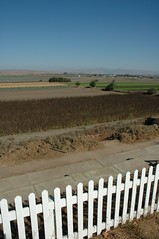
The NOFA (Notice of Funds for Availability) for the Broadband Stimulus package of $7.2 billion has been released. However, the strict definition of broadband will leave many organizations in need dead in the water.
The American Recovery and Reinvestment Act of 2009 has a great deal of focus on broadband in rural areas with $7.2 Billion intended to help the underserved. The probelm now is that the definition of broadband
is one half of a T-1 line or 768 Kbps. This puts a lot of libraries out of the running. In my opinion, libraries were the key to making this connection.
If we have a public community building, with computer and internet access, in a place where there is limited or no connectivity, then provide money to a library that fits all the categories. I have worked in many rural areas and even the ones that are the most cut-off can muster this amount. Therefore, they get no money even though the potential for increased bandwidth that can lead to innovation and job creation is dashed by this restrictive definition. It hits hard because it is too low for the average library to qualify, but it cuts such a small window, that there will be no demand in those communities that ARE that low.
From this
Gigaom article,
One-Third of U.S. Doesn’t Have Broadband:
 "The firm found that the more money a household has, the more likely it is to have a computer and broadband access (see chart). The study also revealed that only 4 percent of subscribers were unsatisfied with their broadband service, and about 29 percent would be interested in faster services. However, 37 percent didn’t feel a need to boost their speeds. In line with other surveys, Leichtman found that 3 percent of Internet subscribers say broadband is not available in their area. So in addition to policies encouraging the buildout of broadband infrastructure, the government should also be thinking about getting computers to lower-income homes and teaching folks the advantages that come with using broadband."
"The firm found that the more money a household has, the more likely it is to have a computer and broadband access (see chart). The study also revealed that only 4 percent of subscribers were unsatisfied with their broadband service, and about 29 percent would be interested in faster services. However, 37 percent didn’t feel a need to boost their speeds. In line with other surveys, Leichtman found that 3 percent of Internet subscribers say broadband is not available in their area. So in addition to policies encouraging the buildout of broadband infrastructure, the government should also be thinking about getting computers to lower-income homes and teaching folks the advantages that come with using broadband."More articles have firmed up this argument:
Free broadband won't entice all (news.bbc.co.uk)
"Broadband is becoming increasingly important to people's ability to participate in the economy and society," said Ofcom's market development partner Peter Phillips.
"The report shows that some creativity will be required if we wish to capture the imaginations of those who have yet to engage with the benefits the internet may bring," he said.
.....(yet)
"Some 43% of adults who currently do not have internet access would remain disconnected even if they were given a free PC and broadband connection."

This debate is interesting because while many advocated for broadband in rural areas, those actually living in those areas are not creating a demand. Many
Internet Service Providers are trying to drum up interest and demonstrate the need. Unfortunately, only communities that have an affluent section will probably get that broadband. They often are the ones that have broadband at home and want to increase their speed or have moved from an area where they had broadband and now they don't.
by smiling_da_vinci
Libraries are typically the only place to get internet access in rural communities. Furthermore, they are the only places to provide fast broadband access. This quick access can create demand from communities for faster access. In the library itself, demand for faster access provided by the library varies by community.
As a private citizen, I can get up to 18 mpbs at my house, but the local library may be only limited to 1.5, that's a big difference. As someone who uses the library, I would think the slow internet would be an embarrassment and wouldn't use it unless it was faster. As a private citizen using dial-up, I wouldn't know what you could do with faster internet. I may not even understand the difference. I would only know that if wanted to send photos to someone via email, it seems like it takes forever. Which brings up another post (humorous),
Gigaom, Broadband Confession: I have Pipe Envy:
"However, my upload speeds are still miserable, at less than 512 kbps, and that’s what has me feeling like an outsider looking in when it comes to technology. Sure, I can talk the talk about broadband as a platform for innovation, and hype cloud computing, online backup and uploading video files. But whenever I attempt it, I have to shamefully set up my uploads for the nighttime hours while I creep off to bed knowing that, otherwise, sending the standard definition video clip of my daughter’s first haircut would cause my Internet connection and daytime productivity to crumble. Om feels my pain."It seems that the demand would be created in reaction to a need. I may not understand the overall value of faster broadband, but it could realize it if day-to-day tasks are executed more quickly. It's difficult not to try to offer broadband everywhere, but it is further difficult to spend money in areas that don't demand it. Things should be equal, but the resource could be wasted. In the end, this legislation is about job creation. However, the only jobs that will be created will be the one time cost of laying down fiber. There aren't any additional jobs created by increasing my bandwidth. After that, the hope is the new faster internet can lead to innovation and opportunities to those in rural areas.
 Image by ai.dan via Flickr
Image by ai.dan via Flickr content. I also think it is ironic that Scribd will start selling e-books when that was one of the biggest book piracy sites available (not of their own doing of course). Many of the book piracy sites are going away now that more attention has been paid. Prior to researching the topic, I didn't realize that most of the books available through these sites didn't exist digitally before. There was no deal with the author or publisher; they were illegal. I think a lot of this can be stopped if more current e-books are available online through public libraries. They are the only medium that currently provides free content that is legal. I just hope that isn't taken away in the digital age.
content. I also think it is ironic that Scribd will start selling e-books when that was one of the biggest book piracy sites available (not of their own doing of course). Many of the book piracy sites are going away now that more attention has been paid. Prior to researching the topic, I didn't realize that most of the books available through these sites didn't exist digitally before. There was no deal with the author or publisher; they were illegal. I think a lot of this can be stopped if more current e-books are available online through public libraries. They are the only medium that currently provides free content that is legal. I just hope that isn't taken away in the digital age.
![Reblog this post [with Zemanta]](http://img.zemanta.com/reblog_e.png?x-id=c7bcf818-4e85-4214-893e-318db19d65aa)



![Reblog this post [with Zemanta]](http://img.zemanta.com/reblog_e.png?x-id=86511e84-bcaf-4a60-8b8b-f54c9a04e4f6)